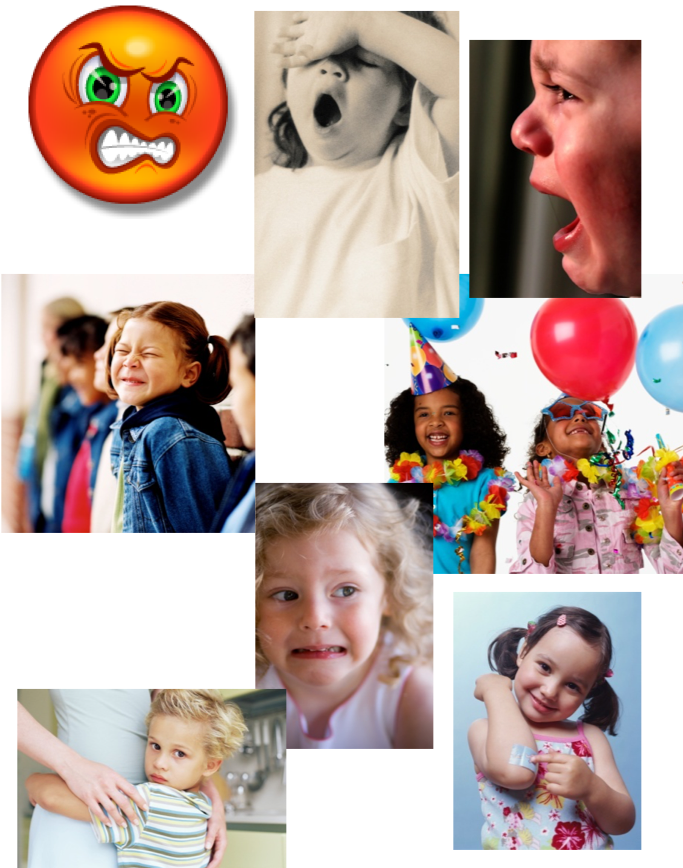Question
What is emotional literacy?
Answer
Emotional literacy is the ability to read (identify), label, understand and act upon the feelings (emotions) of oneself and others in a healthy and socially acceptable manner.
I use the term emotional literacy and the Pyramid Model uses the term emotional literacy and many of my colleagues do, because we refer to it as the ability to be able to read (identify), and then label, understand, and act upon our own feelings. We should be supporting a child to be able to read, label, understand, and act upon his or her feelings or emotions about himself, but also to be able to read others' emotions in a healthy and socially acceptable manner.
Look at all the faces and identify what emotion you see in each one.

We see a red, hot face that looks like anger. We see a child yawning, but that's not emotional, that has to do with wellness, I'm tired. A crying child with a very red face could be angry, sad, or be frustrated because a game's not working the way she wants it to. The girl in the jean jacket looks pretty upset. Then we look at the balloons and we see what appear to be very happy children around the balloons. The little girl with the blonde, curly hair might be scared. The little girl with the bandage on her elbow was probably crying before and now she seems pretty happy that the adult that she trusted could help her take care of the boo-boo on her elbow. Then look at the little guy hugging his mommy. How many of us have friends or our own children who have hugged us tightly when a stranger approached or a new person came to the house?
Variables Impacting a Young Child’s Emotional Literacy Development
- Child’s temperament
- Developmental status of the child
- Parental socialization skills
- Parental mental health
- Environmental support
- Disability
- Educator/therapist support of child emotional literacy
There are several variables that impact young children's emotional literacy development.
The child's temperament. We all come into the world with our own temperament and then we interact with the world. Some people are quieter. Some children are more pensive and they watch a situation before they go into it. Then we have some children that jump into those situations and create a lot of chaos and their temperament is more, “Let's take charge of the world, hello world, here I am today.”
The developmental status of the child, including where he or she is motorically and visually. Are there some sensory processing issues that are impacting the child's emotional literacy? I had a little boy that I taught and he didn't play outside on the playground at his childcare center very well. He pretty much stood off and watched the other children play and it was assumed that he didn't want to play. Then, when I watched closely outside on the playground and then, in the classroom, I saw that he avoided things like puzzles. I asked his teacher if his vision had been screened. The teacher spoke to the parents about that and he came to school the next week and he had thick glasses on, which meant that his vision was pretty bad. All of a sudden, like a light switch went off, he was drawn to the puzzles and he would chat with his friends that were sitting next to him doing puzzles. He was outside climbing all the equipment and riding the bicycle and playing with his friends and laughing. It's important to look at the whole child.
We have to look at parental socialization skills. What type of environment does the child come from? Are his parents quieter? For example, I have been in several situations working with children on the autism spectrum where when I met the parents it was very apparent that one of the parents also fell on the spectrum of autism. In the home environment, there were challenges in terms of social and emotional development by virtue of the challenges the parent faced.
The parent's mental health impacts children as well, as evidenced by the story I told earlier about my friend who was raised by a mom with bipolar disorder. The environmental supports for a child, not only out in the home but in the community and in the classroom impact children’s emotional literacy development too, as well as disability.
Also important to children and an impact on their emotional literacy development is your emotional literacy, as the educator. Are you limited in angry, happy, sad and frustrated and maybe don't have the nuances of apprehension, bravery, being nervous, being tired, and being able to tell other folks that? We have to understand our emotional literacy.
This Ask the Expert is an edited excerpt from the course, Supporting Young Children's Social-Emotional Literacy - Part 1, by Pamelazita Buschbacher, EdD, CCC-SLP.
